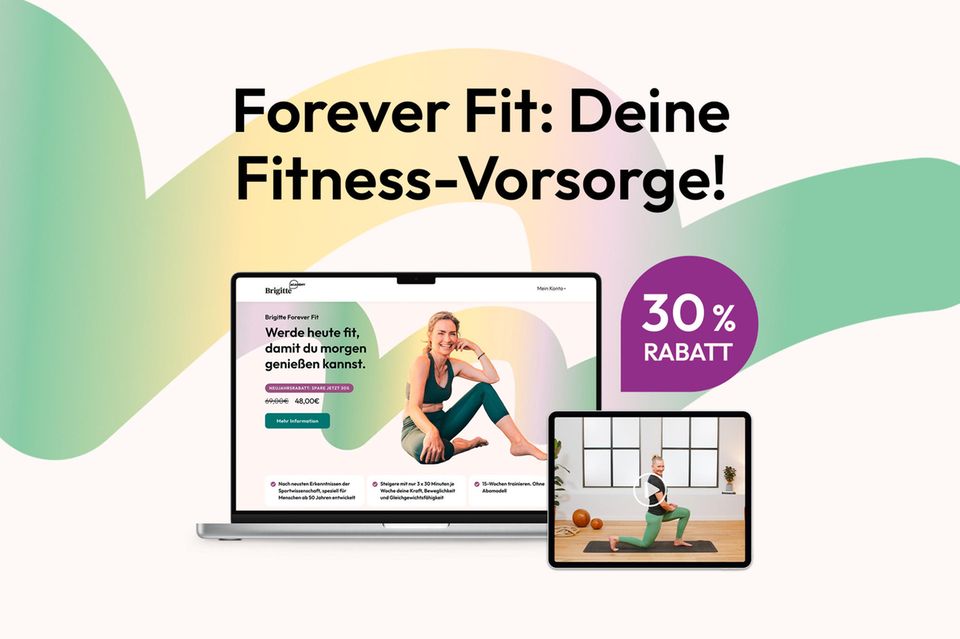Fit over 40: Is it still worth starting to exercise in midlife?

The earlier we start exercising regularly, the healthier we tend to age. But does that mean that after a certain age it is no longer worth exercising more? And: This is what we should pay attention to when we start exercising in midlife.
We need enough exercise to stay fit and healthy in the long term. This applies to young people as well as to middle age. From the age of 40, however, regular exercise becomes essential because our muscles are now atrophying and our bodies have a harder time building new muscles . It helps immensely if we do something good for our health with workouts before waiting until this phase of life. But fortunately it is never too late - we can start exercising regularly at any age and age more healthily.
Muscle strength can be increased at any ageHow fit we are as we get older also depends on our general fitness level. The best scientific marker for this is the body's maximum oxygen uptake capacity, explains sports physician Prof. Dr. Klaus-Michael Braumann to "Geo". "Regularly active seniors often still achieve an oxygen uptake capacity at the age of 60 that corresponds to that of untrained 20 to 30-year-olds."
But even those who are less fit can still achieve enormous increases in performance as they get older. "Even at the age of 90, women can still increase their maximum strength by up to 180 percent through moderate strength training."
The expert's position is therefore clear: it is never too late to become active. We can start exercising and playing sports regularly at any age. Even those who have carried the belief "I'm not sporty, I can't change that anyway" around with them their whole life can and should break free from it. It doesn't matter whether they are 25, 40 or 70. And they should, so that their strength, mobility, coordination and body awareness do not suffer as they get older.
There is another good argument for exercise in midlife: our bone health. During menopause, the risk of diseases such as osteoporosis increases. And exercise, especially strength training, helps prevent this.

Get fit today so you can enjoy tomorrow! BRIGITTE Forever Fit is the fitness course for women over 50. Start now and lay the foundation for a healthy, active life full of energy and joy!
By the way, it is not only important for a healthy body to exercise regularly. Our minds also benefit from it. "I am always amazed at how little people know about the amazing benefits of exercise for cognitive abilities: for memory, imagination, anticipation, reaction speed and intellectual performance," explains sports physician Braumann. "The plasticity of the brain - its ability to adapt to new situations - is much better preserved." With regular exercise, we also keep our brain fit and increase our chances of remaining mentally clear even in old age.
Fit over 40: What you should pay attention to when exercisingAre you convinced and would like to start training regularly? According to Professor Braumann, this is important:
1. The right trainingBraumann recommends a mixture of muscle and cardio training: "The ideal thing is to exercise at least three times a week for an hour at a medium intensity level - ideally a combination of endurance and strength training." HIIT workouts (high-intensity interval training), for example, are very suitable here because they increase the pulse and at the same time activate the muscles with exercises such as squats, burpees or lunges.
But of course you can also combine other sports, depending on what you enjoy. For example, if you are a passionate jogger or cyclist and get your money's worth in terms of endurance, you could also integrate strength training in the gym or at home into your exercise plan.
2. Get checked"Newcomers and those returning to exercise should have their health checked beforehand," says the expert. "We recommend a sports medical examination from the age of 35." This can be used to determine your individual fitness level, ideally with a performance diagnosis that determines the optimal individual intensity. This way you know exactly how much you can currently demand of your body and how you can gradually increase the workload.
3. Don't overdo itIf you do such an examination, you might be surprised at the low intensities that are recommended for you to start with. However, Braumann says it is important to stick to these tips to avoid injuries and long-term damage. So don't overdo it, especially at the beginning, listen to your body and give it at least one day of rest between training sessions.
mbl Brigitte
brigitte






